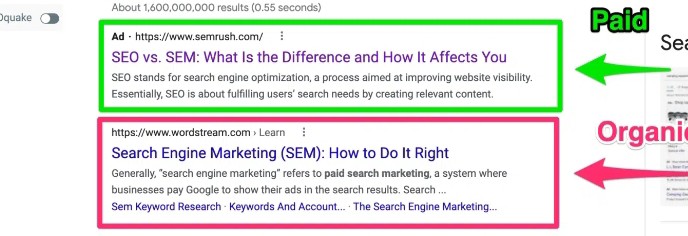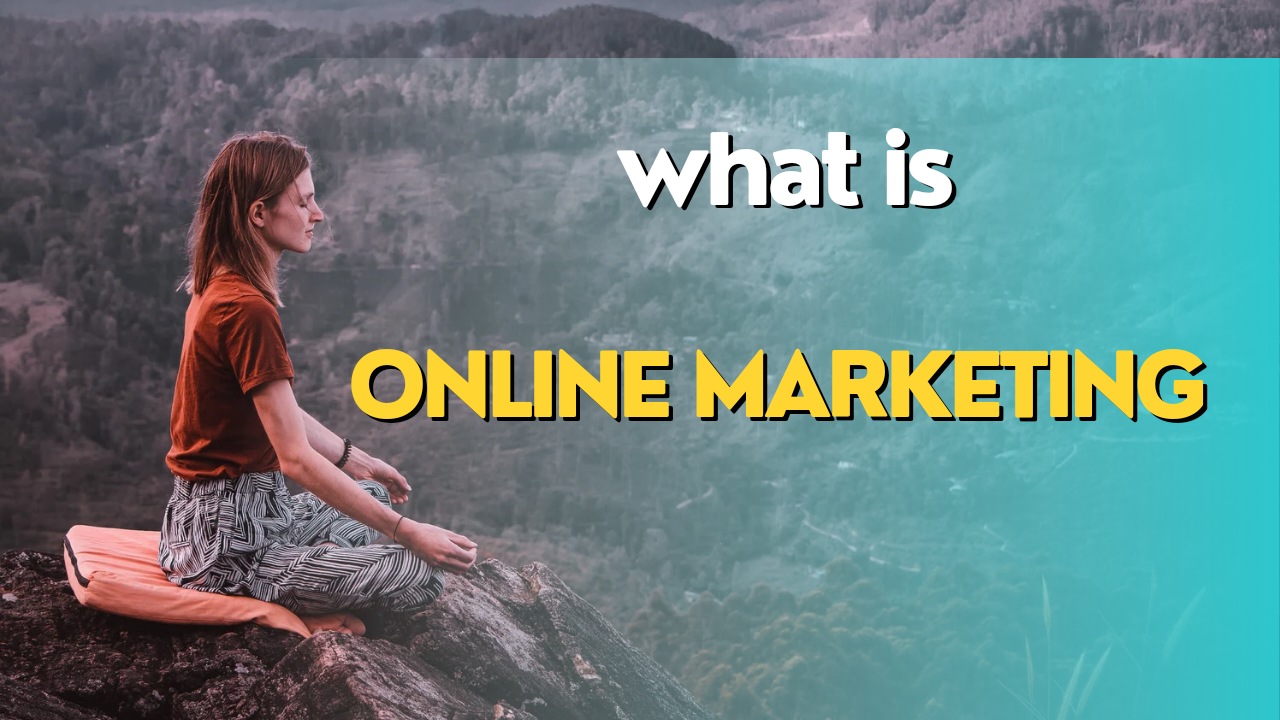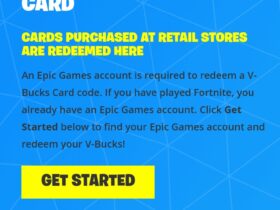Hey there! Let’s talk about online marketing, a super cool way to promote stuff on the internet. It’s like the secret sauce to reaching a lot of people and making your mark online.
In the old days, marketing was all about making connections and building a big company. If you were in the arts, music, or movies, you had to get everyone in your industry to know you. But guess what? Things have changed!
You can achieve incredible things without even leaving your home! I’m serious! You have the power to build a successful business right from your couch or even your living room floor.
Imagine this: You have a regular job, but during your free time or on weekends, you can work on your own business online. You don’t need a fancy office or a big team. Just you, your computer, and a cozy spot at home.
I’m not exaggerating when I say that online marketing can help you create the life you’ve always dreamt of. And trust me, I know what I’m talking about.
Now, let’s dive into what online marketing really is. It’s all about using clever strategies and techniques to promote your products or services on the internet. It’s like having a powerful tool to connect with a massive audience and grow your online presence.
For example, think about all those ads you see on social media, like Facebook or Instagram. Those are part of online marketing. Companies use them to grab your attention and get you interested in what they have to offer.
But online marketing is not just about ads. It’s also about creating amazing content, like blog posts, videos, or podcasts, that people love and want to share with others. It’s about building a strong brand, engaging with your audience on social media, and using search engines like Google to get more visibility.
So, if you’ve ever wanted to have a blast at work while reaching a ton of people online, online marketing is your golden ticket. And don’t worry if you’re already familiar with it – you’ll still learn tons of new things in this guide.
Definition of Online Marketing
So, online marketing is all about promoting stuff on the internet. It’s like spreading the word about a product or service using clever strategies online. It helps you reach a lot of people and get them interested in what you have to offer.
Imagine you have something really cool to sell, like handmade jewelry or a fitness program. But here’s the thing – not many people know about it yet. That’s where online marketing comes in. It helps you get the word out and attract customers.
One way online marketing works is through ads. You know when you’re scrolling through social media, and you see ads for things you might like? That’s online marketing in action. Companies use those ads to catch your attention and show you their awesome products or services.
But online marketing is not just about ads. It’s also about creating interesting and useful content that people enjoy. Think of videos on YouTube or blog posts that teach you something new or entertain you. By sharing great content, you can get people interested in what you do and build a following.
Another aspect of online marketing is engaging with people on social media. You know those brands that reply to your comments or share interesting posts that make you want to learn more about them? That’s all part of their online marketing strategy. They want to connect with you, build a relationship, and keep you interested in what they have to offer.
The cool thing about online marketing is that you can target specific groups of people who are most likely to be interested in what you’re selling. It’s like finding the right audience for your product or service. By reaching the right people, you have a better chance of making sales and growing your business.
So, online marketing is like a toolbox of strategies that helps you promote your stuff on the internet. It’s about reaching people, getting them excited about what you offer, and building a community of fans. It may seem a little overwhelming at first, but with some learning and practice, you’ll become a professional at it.
Overview and Types of Online Marketing
SEO (Search Engine Optimization)
PPC (Pay-Per-Click) Advertising
SEO (Search Engine Optimization)
SEO, or Search Engine Optimization, is the process of improving your website so that it shows up higher in search engine results. When people search for something on search engines like Google, SEO helps your website get noticed and appear at the top of the results.
In the online marketing world, SEO is crucial. When people are searching for products or services online, they often start by using a search engine. If your website is optimized for SEO, it means it’s easier for potential customers to find you. When your website appears higher in search results, it increases the chances of people clicking on your website and learning about your business.
For example, let’s say you have an online store that sells handmade jewelry. If you optimize your website for SEO, it means that when someone searches for “handmade jewelry,” your website has a better chance of showing up at the top of the search results. This can lead to more people visiting your website, exploring your products, and potentially making a purchase.
SEO is closely related to online marketing because it helps you attract targeted traffic to your website. By optimizing your website for SEO, you’re essentially making it more visible and accessible to potential customers who are actively searching for products or services like yours. It’s an important part of online marketing because it helps drive organic (non-paid) traffic to your website, increase brand visibility, and ultimately boost your online sales and conversions.
SEM (Search Engine Marketing)
SEM, or Search Engine Marketing, This is like SEO, but you pay search engines like Google to show ads for your website in search results. The goal is to bring in more visitors and potential customers. In simple terms, it means using various strategies to make sure that a website appears prominently when people search for related keywords on search engines like Google or Bing.
SEM is closely related to online marketing because it focuses on promoting websites and driving traffic through search engines. It involves using paid advertising methods, such as pay-per-click (PPC) campaigns, where advertisers bid on keywords that are relevant to their business. When someone searches for those keywords, the ads appear at the top or bottom of the search results, and advertisers pay a fee when people click on their ads.
Here’s how it works: Let’s say you have a website selling pet supplies. With SEM, you can create ads that show up at the top or bottom of search results when someone searches for keywords like “dog toys” or “cat food.” These ads are often marked as “sponsored” or “ad” to indicate they are paid placements.

When someone clicks on your ad, they are directed to your website, and you pay a fee for that click. This approach is called pay-per-click (PPC) advertising because you only pay when someone actually clicks on your ad.
For example, if you bid on the keyword “dog collars” and your bid is higher than that of other advertisers, your ad may appear at the top of the search results when someone searches for that keyword. If someone clicks on your ad and buys a dog collar from your website, it can lead to a sale for your business.
SEM also includes search engine optimization (SEO), which is the process of optimizing a website’s content, structure, and other factors to improve its organic (non-paid) rankings in search engine results. SEO aims to increase a website’s visibility and attract more organic traffic from search engines without having to pay for each click.
By using SEM, businesses can reach potential customers who are actively searching for products or services related to their business. It helps drive targeted traffic, increase brand exposure, and potentially lead to more conversions.
In summary, SEM is a way to promote websites through paid advertisements in search engine results, while SEO focuses on optimizing websites to improve organic rankings. Together, they form an essential part of online marketing by helping businesses attract potential customers and increase their online visibility.
Content Marketing
Content marketing is a strategy used in online marketing to attract and engage a specific audience by creating and sharing valuable, relevant, and informative content. It involves creating and distributing content such as articles, blog posts, videos, infographics, and social media posts that provide value to the target audience.
The main goal of content marketing is to build a relationship with the audience by offering them useful information or entertainment rather than directly promoting a product or service. By providing valuable content, businesses aim to gain the trust and loyalty of potential customers, which can lead to increased brand awareness, customer engagement, and ultimately, conversions.
Content marketing is closely related to online marketing because it uses different online channels and platforms to share the content with the right people. These channels include websites, blogs, social media platforms (like Facebook and Instagram), email marketing, and video-sharing platforms (like YouTube). By using these online avenues, businesses can reach and connect with their target audience effectively.
For example let’s say there’s a company that sells fitness equipment. They could create blog posts and videos that give advice on exercises, share healthy recipes, and show workout routines. By putting this content on their website and social media pages, they will attract people who are interested in fitness. As they consistently provide helpful information, people will start to trust them as a reliable source. This can make more people recognize and remember their brand, and they may become loyal customers. Ultimately, this can lead to more sales and money for the company.
In summary, content marketing is an effective strategy in online marketing as it helps businesses establish their authority, engage with their target audience, and drive traffic to their website or other online platforms. By providing valuable content, businesses can build a strong online presence and connect with potential customers in a meaningful way.
Social Media Marketing
Imagine you’re at a party or a gathering with a lot of people. You have something important to share with everyone there, like a new product you’ve created or a special promotion you’re running. How would you go about letting everyone know? One way could be by talking to each person individually, but that would take a lot of time and effort. Instead, you could stand up in the center of the room and make an announcement that reaches everyone at once. That’s kind of how social media marketing works, in the digital world.
Social media marketing is all about using social media platforms like Facebook, Instagram, Twitter, and LinkedIn to promote your business, products, or services to a large audience. It’s like having a virtual megaphone to share your message with thousands or even millions of people at once.
Here’s how it works: First, you create a business account on the social media platform of your choice. This account represents your brand or company. You can then start creating posts and sharing content that is relevant and interesting to your target audience. The idea is to build a presence and engage with your customers in a more personal and interactive way. You can share updates about your business, offer special deals or discounts, provide helpful information, and even showcase your brand’s personality.
But it’s not just about posting content. Social media platforms also allow you to interact directly with your customers and potential customers. You can respond to their comments, answer their questions, and even run contests or giveaways to create excitement and engagement.
In addition to organic reach, social media marketing also offers paid advertising options. This means you can create targeted ads that will be shown to specific groups of people who are more likely to be interested in what you’re offering. For example, if you sell beauty products, you can create ads that are shown only to people who are interested in beauty and skincare. This helps you reach the right people who are more likely to be interested in what you have to offer.
The beauty of social media marketing is that it provides you with insights and analytics. This means you can see how your posts are performing, what content is resonating with your audience, and how many people are engaging with your ads. This information helps you understand what’s working and what’s not, so you can make adjustments and improve your marketing strategies over time.
By using social media marketing effectively, you can build brand awareness, reach a wider audience, and ultimately drive more traffic to your website or physical store. It’s a way to connect with people in a more personal and interactive manner, and it allows you to showcase your unique brand personality.
So, social media marketing is not just about scrolling through your personal feed. It’s about leveraging the power of social media platforms to promote your business, engage with your audience, and grow your brand.
PPC (Pay-Per-Click) Advertising
Pay-per-click (PPC) advertising is when you pay for every click on an ad you create. It’s like paying for each person who visits your store after seeing a billboard outside. Many platforms offer PPC ads, such as Google Ads and Facebook.
Let’s take Facebook as an example. On Facebook, you can create an ad that looks like a regular post. You can target a specific group of people based on things like their location, age, and interests. For instance, if you sell sports equipment, you can show your ad to people who are interested in sports.
When you create the ad, you also set a budget. This is the maximum amount you’re willing to pay for each click on your ad. Once your ad is ready, Facebook will display it in the news feeds or sidebars of the people you’re targeting.
When someone sees your ad and clicks on it, they will be taken to a page you choose. It could be your website, an online store, or a specific landing page. The goal is to get them interested in what you’re offering and take some action, like making a purchase or signing up for a newsletter.
Let’s say you run a bakery and want to promote a special discount on your cakes. You create a Facebook ad with a picture of your delicious cakes and the discount details. You target people in your local area who have shown an interest in baking or dessert recipes. When someone on Facebook sees your ad and clicks on it, they’ll be directed to your website where they can learn more about the discount and place an order.
PPC advertising is a way to reach a specific audience and only pay when people actually engage with your ad. It’s like paying for customers who come into your store after seeing your ad. By choosing the right audience, creating compelling ads, and setting a budget, you can effectively promote your products or services online.
Affiliate Marketing
Affiliate marketing is a way to make money by recommending products or services to other people. Let me explain it in simpler terms.
Let’s imagine that you know a really awesome pizza place run by a guy named Frank. You love their pizza, and you often tell your friends how great it is.
One day, your friend Tim decides to try out the pizza place because of your recommendation. He ends up buying four pizzas for his friends. When you go back to the pizza place, Frank thanks you for bringing in such a big order and gives you $7 as a way of saying thank you for bringing such a big customer to his place.
That’s basically how affiliate marketing works!
But in real life, it mostly happens online. Take Amazon, for example. They have a program called Amazon Associates, which is their affiliate program.
When you join Amazon Associates, they give you a special link for any product on their website. You can share this link on your blog, on social media, or even send it directly to your friends. If someone clicks on your link and buys something from Amazon, you earn a small commission as a reward for referring that customer.
Let me give you an example. Let’s say you have a blog that is about cooking, and you write a post about your favorite kitchen gadgets. In that post, you add links about these cooking gadgets to your blog post using your unique affiliate links. If someone reads your blog post, clicks on one of the links, and makes a purchase, you’ll earn a commission from Amazon.
Affiliate marketing is closely related to online marketing because it’s a way for companies to promote their products or services through individuals like you. Instead of spending a lot of money on traditional advertising, they rely on people who genuinely like their products to spread the word.
Affiliate marketing allows you to earn money by leveraging your own influence and recommendations. It’s a win-win situation because you get rewarded for promoting products you believe in, and the companies get new customers.
If you want to learn more about affiliate marketing, I can recommend some helpful resources:
1. “How to Start A Blog That Makes You Money” – This guide will show you how to create a blog that can make money through affiliate marketing.
2. “6 Advanced Affiliate Marketing Strategies to Try” – Discover effective strategies to take your affiliate marketing efforts to the next level.
3. “How to Boost Your Growth With Affiliate Marketing” – Learn how to maximize your earnings and grow your affiliate marketing business.
These resources will give you a solid starting point to dive into affiliate marketing and start earning money by sharing products or services you love with others.
Email Marketing
Email marketing is when businesses send emails to people who have agreed to receive them. It’s a way for businesses to talk directly to their customers, share useful information, and promote their products or services.
In online marketing, email marketing is an important tool. It lets businesses reach their customers directly through email. It’s like sending a personalized message to someone’s email inbox.
Here’s how it works: Businesses collect email addresses from people who are interested. For example, you might sign up for a newsletter or give your email address for updates or special offers.
Once you’re on a business’s email list, they can send you regular emails. These emails can have different things, like announcements, news, tips, discounts, or exclusive content. The idea is to give you something valuable and stay connected.
Email marketing is related to online marketing because it helps businesses promote themselves and their products or services online. It’s a way to talk with customers, build relationships, and make sales. Businesses can combine email marketing with other online marketing strategies, like social media or ads, for a complete marketing plan.
For example, let’s say you join a clothing store’s email list. They might send you emails about new clothes, upcoming sales, or fashion tips. By getting these emails, you’ll know about the latest trends and deals, and you might be more likely to buy something from that store.
Email marketing works well because it lets businesses talk directly to customers in a personal way. It builds trust and loyalty over time by sending useful emails to people who are interested.






Leave a Review